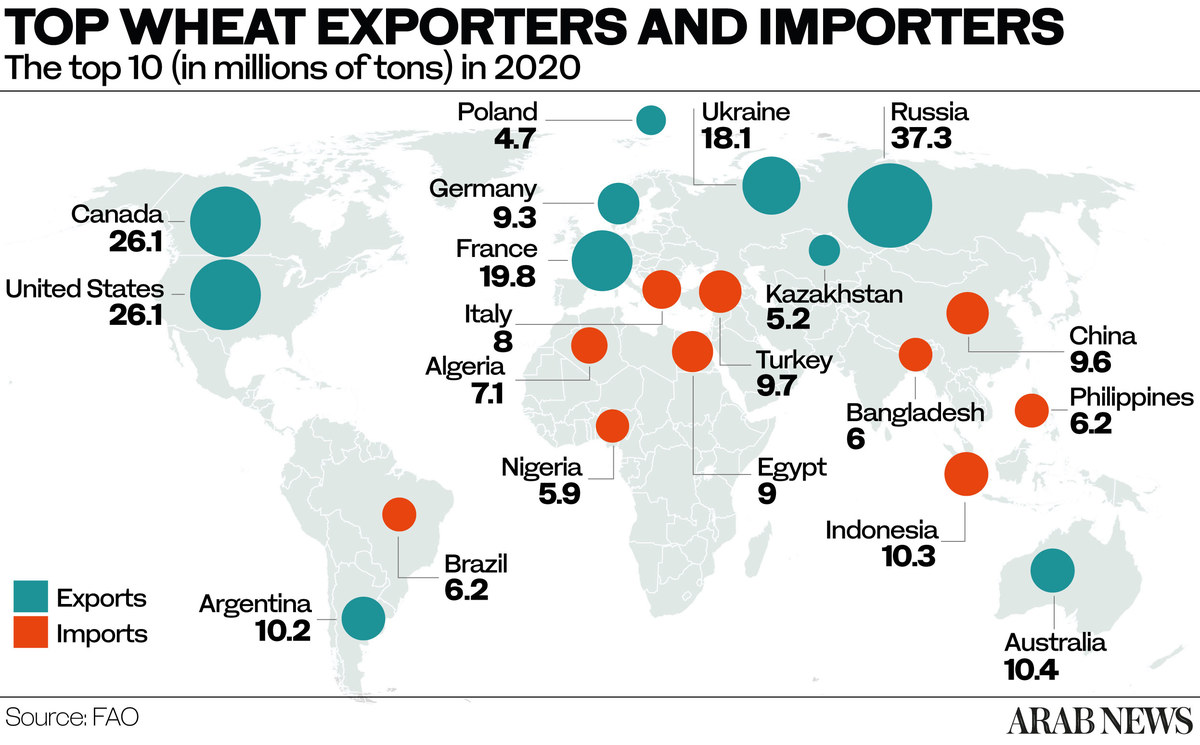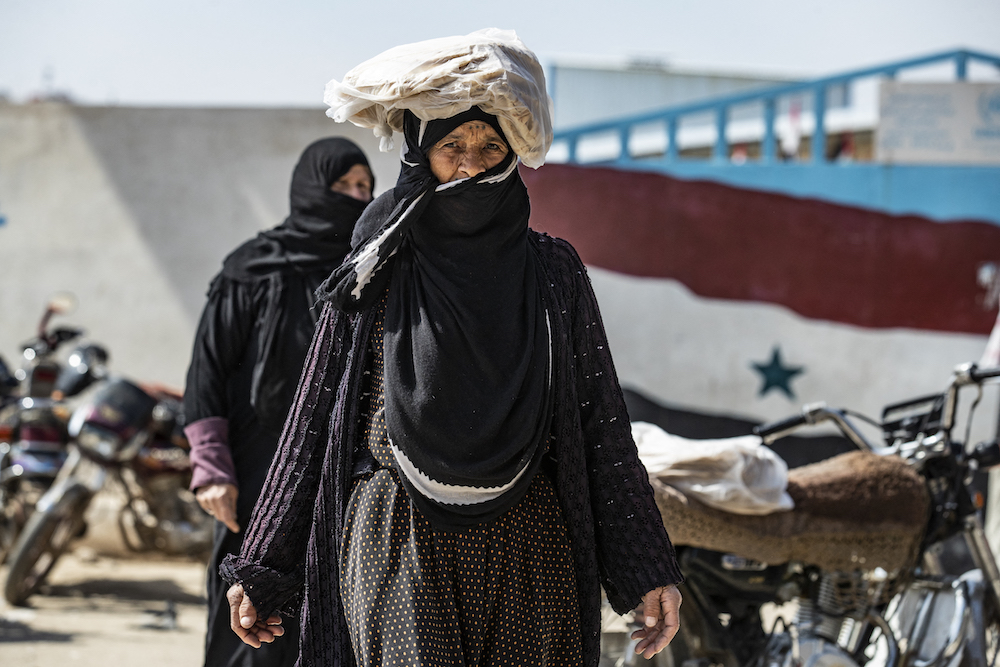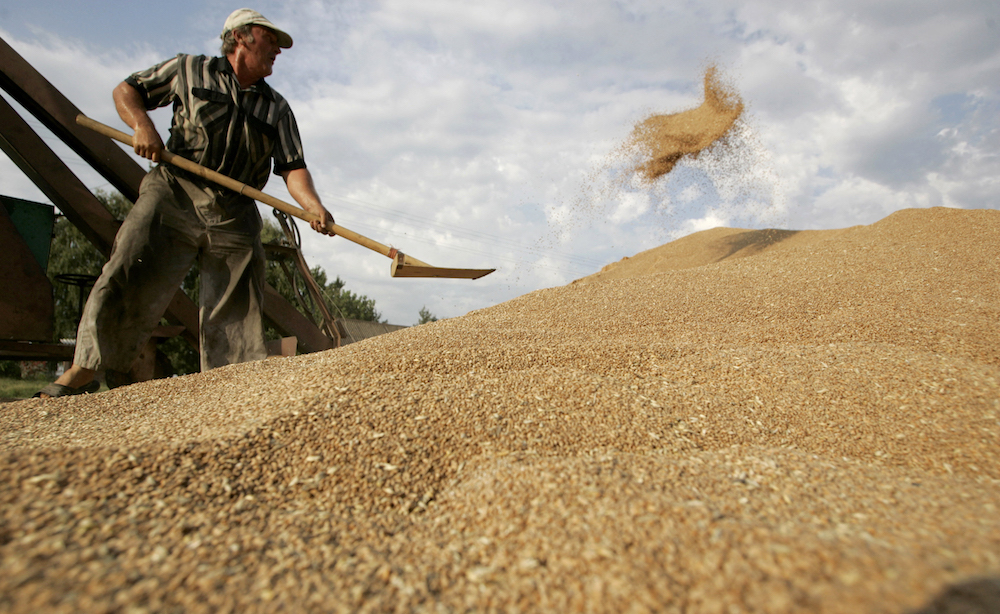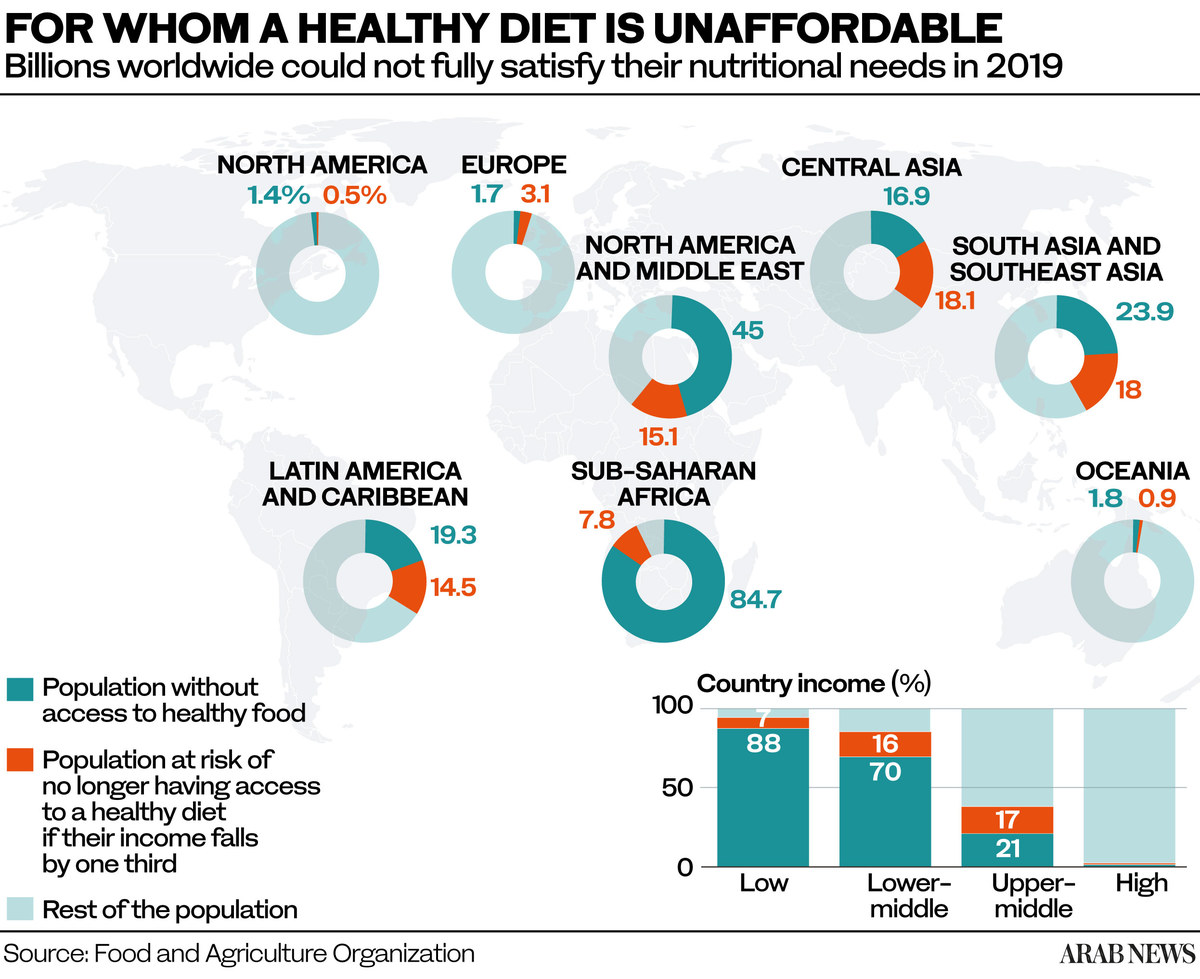DUBAI: As Russia’s invasion of Ukraine entered its second month, having triggered the biggest surge in food prices since the recession of 2008, the World Food Program warned that the world’s hungry simply “cannot afford another conflict.” It was no exaggeration.
Soaring prices of food, fertilizer and fuel pose a clear and imminent threat to vulnerable communities and hunger hotspots across the Middle East and North Africa. Entire populations are feeling the adverse effects of a war being fought thousands of miles away from the region.
“The consequences of the conflict in Ukraine are radiating outwards, triggering a wave of collateral hunger that is spreading across the globe,” Reem Nada, a spokesperson for WFP MENA, told Arab News.
Given that Russia is the world’s biggest exporter of wheat, and Ukraine the world’s fifth, disruption to the distribution of grain is having a significant impact on the price of staples such as bread on a global scale.

Combined, Russia and Ukraine account for more than half of the world’s sunflower seed oil exports as well as 19 percent of the world’s barley supply, 14 percent of wheat and 4 percent of maize, making up nearly a third of global cereal exports.
Nada said that Yemen, Egypt and Lebanon — three countries that were already reeling from the disruptive effects of the COVID-19 pandemic, conflicts and structural imbalances — are especially vulnerable to the economic fallout from the war in Ukraine.
In the war zone itself, the collapse of Ukraine’s food supply chains has led to shortages in major cities, including the capital Kyiv. Long known as “Europe’s breadbasket,” the country is likely to miss critical planting and harvesting seasons this year, compounding the crisis.

Soaring food prices pose a threat to vulnerable communities across the Middle East and North Africa. (AFP)
At the same time, Western sanctions imposed on Russia, a major exporter of fertilizers including potash, ammonia, urea and other soil nutrients, means farmers are scaling back production or anticipating reduced yields.
As a result, the price of wheat has shot up by 21 percent, barley by 33 percent, and some fertilizers by 40 percent in the last month alone.
“Russia and Ukraine are the largest suppliers of wheat to the Middle East,” Kerry Anderson, a political and business risk consultant, told Arab News.
“Egypt is particularly dependent on imports from the two countries, and the spike in bread prices came as the government there was planning to reduce bread subsidies.”
FASTFACT
* Percentage of wheat imports from Ukraine:
- Lebanon: 50 percent
- Tunisia: 42 percent
- Yemen: 22 percent
(Source: WFP)
More than 70 million Egyptians rely on subsidized bread, according to the WFP. In 2021, roughly 80 percent of the country’s wheat imports came from Russia and Ukraine.
“Tunisia, Libya, Lebanon, Turkey and Yemen also are all vulnerable to supply disruptions from Russia and Ukraine and increased prices,” Anderson said.
Yemen depends almost entirely on food imports, and Ukraine accounted for 31 percent of its wheat supplies during the past three months.
Currently, 31,000 people in Yemen are experiencing famine-like conditions, a number that is expected to soar to 161,000 by June of this year, according to the latest figures from the Integrated Food Phase Classification scale. By the end of the year, 7.3 million people in the war-ravaged country could be at “emergency levels of hunger.”

The consequences of the conflict in Ukraine are radiating outwards, triggering a wave of collateral hunger that is spreading across the globe, according to WFP's Reem Nada. (AFP)
“The economic crisis in Yemen — a by-product of the civil conflict — and the depreciation of the currency have already pushed food prices in 2021 to their highest levels since 2015,” Nada said. “The Ukraine crisis is another blow to Yemen, driving food and fuel prices further up.”
The result is an increase in the number of people in need of food assistance from 16.2 million to 17.4 million. Aid agencies warn this number could rise further if funding gaps are not plugged, as the cost of delivering assistance is also rising.
Currently, the WFP has just 31 percent of the funding it needs to continue operations in Yemen over the next six months. “The Ukraine crisis is making a bad funding situation worse,” Nada said.
The situation is similar in Lebanon, which imports about 80 percent of its wheat from Ukraine. Even before the outbreak of war, food prices in Lebanon had risen by nearly 1,000 percent since October 2019, a result of the country’s economic and financial crises, compounded by the Beirut port blast of August 2020 and the COVID-19 pandemic.
“The war in Ukraine further exacerbates the suffering of millions because of the ongoing economic crisis where more than 80 percent of the population has been plunged into poverty and are in the middle of a humanitarian catastrophe created by a financial meltdown,” Nada told Arab News.

Given that Russia is the world’s biggest exporter of wheat, and Ukraine the world’s fifth, disruption to the distribution of grain is having a significant impact on the price of food staples. (AFP/File Photo)
With a lengthening list of Arab countries in dire need of food assistance, experts in the field of sustainability are searching for innovative solutions to help the region grow and manage its own crops with fewer resources.
“Food security is not just about raising a few vegetables but a range of cash crops which can grow and be sustained in the region, putting less of a burden on imports,” Chandra Dake, CEO of the UAE-based agri-tech company Dake Rechsand, told Arab News.
To ease the region’s heavy reliance on imports, Dake believes his “magic sand” technology could help farmers transform desert into arable land capable of growing a variety of fruits, vegetables and even water-intensive crops such as rice.
“We now have 28 types of fruit tree that we have grown in the country, which were never grown on a commercial scale,” said Dake of his company’s recent developments in the UAE. “This is something that can help with food security.”

In the arid Middle East and North Africa, food security is inextricably tied to water security. Poor water conservation and unsustainable farming practices, combined with the creeping effects of climate change, have depleted the region’s natural aquifers and degraded soil quality.
“The war in Ukraine erupted at a time when a drought in North Africa was already undermining wheat production there,” Anderson said.
Speaking to Arab News, Omar Saif, a sustainability consultant at WSP Middle East, cautioned that food security in the Arab region could be further undermined by dwindling water resources. “The common denominator flowing throughout this is water; more importantly the availability of reliable and sustainable freshwater sources,” he said.
Nevertheless, there are ways to streamline water management — through targeted distribution and tariff reform, for instance — that regional governments can take to enhance food security, he said.
INNUMBERS
* 8% - Rise in food prices witnessed in Iraq within 2 weeks of Ukraine invasion.
* 2/3 - Proportion of people in Yemen who need food assistance simply to survive.
* 12.4m - People in Syria who are deemed food insecure.
(Source: WFP)
“Agricultural policies and fiscal support for farmers could also help alleviate strains on food systems through training, education on optimum crop selection, as well as bans on the production of water-intensive crops with low yield and low returns,” Saif told Arab News.
“It is not about maximizing profit per kilogram of production but providing some level of localized food production for local needs in an environment that is incredibly water-scarce, lacks arable land, and experiences vast seasonal variations in extreme temperature.”
For the GCC countries, the challenge going forward will be to “maximize nutrition per kilogram of production, with as little water input as possible.”
Elsewhere in the Middle East, however, the food situation is likely to remain precarious. “WFP’s meager resources for operations, in Yemen and Syria especially, will be under even more pressure than before,” Nada told Arab News.
“We are doing everything possible to mobilize world attention and support — through governments, the private sector and individuals — to avoid the need for drastic action later.”






















